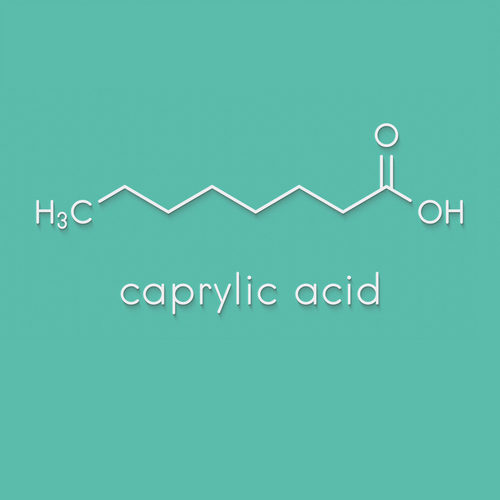Monographs licensed from Therapeutic Research Center, LLC
Scientific names: Octanoic Acid
Alternate names: Octanoate
Actions: Antibacterial, Antifungal, Cardiovascular, Gluconeogenesis, Hydrolysis, Hepatic, Immunomodulatory, Lipid, Octanoic acid breath test
Scientific names: Octanoic Acid
Alternate names: Octanoate
Actions: Antibacterial, Antifungal, Cardiovascular, Gluconeogenesis, Hydrolysis, Hepatic, Immunomodulatory, Lipid, Octanoic acid breath test
Caprylic acid (octanoic acid) is a medium-chain fatty acid that is naturally found in palm oil, coconut oil, and the milk of humans and some animals.
Caprylic acid is a part of medium-chain triglyceride (MCT) products. It might have anti-inflammatory effects.
People use caprylic acid for epilepsy, a nerve disorder that causes uncontrollable shaking (essential tremor), kidney failure, digestive disorders, and many other conditions, but there is no good scientific evidence to support these uses.
When taken by mouth: Caprylic acid is commonly consumed in foods. It is possibly safe when used as medicine for up to 20 days. It's usually well tolerated, but side effects might include stomach discomfort and change in taste.
Special Precautions & Warnings:
Pregnancy and breast-feeding: Caprylic acid is commonly consumed in foods. There isn't enough reliable information to know if caprylic acid is safe to use in larger amounts when pregnant or breast-feeding. Stay on the safe side and stick to food amounts.
Liver disease: Caprylic acid is broken down by the liver. People with liver disease might not be able to break down caprylic acid. But it's not clear if this is a major concern. Until more is known, use with caution.
Medium-chain acyl-CoA dehydrogenase (MCAD) deficiency: People with MCAD deficiency are not able to break down caprylic acid. This can lead to increased levels of caprylic acid in the blood, which might increase the risk of serious side effects. Avoid using.
Weak and brittle bones (osteoporosis): People with osteoporosis have weak and brittle bones. Caprylic acid might make bones weaker and more brittle. Until more is known, use with caution.
There is interest in using caprylic acid for a number of purposes, but there isn't enough reliable information to say whether it might be helpful.
Caprylic acid is found in foods that contain palm oil and coconut oil.
As medicine, there isn't enough reliable information to know what an appropriate dose of caprylic acid might be. Keep in mind that natural products are not always necessarily safe and dosages can be important. Be sure to follow relevant directions on product labels and consult a healthcare professional before using.
Interactions with pharmaceuticals
Medications for high blood pressure (Antihypertensive drugs)
Interaction Rating=Moderate Be cautious with this combination.
Caprylic acid might lower blood pressure. Taking caprylic acid along with medications that lower blood pressure might cause blood pressure to go too low. Monitor your blood pressure closely.
NSAIDs (Nonsteroidal anti-inflammatory drugs)
Interaction Rating=Moderate Be cautious with this combination.
Taking caprylic acid with nonsteroidal anti-inflammatory drugs (NSAIDs) might increase levels of NSAIDs in the body. This might increase the effects and side effects of NSAIDs.
Warfarin (Coumadin)
Interaction Rating=Moderate Be cautious with this combination.
Taking caprylic acid with warfarin might increase levels of warfarin in the body. This might increase the effects and side effects of warfarin. Until more is known, be sure to have your blood checked regularly. The dose of your warfarin might need to be changed.
Interactions with herbs & supplements
Herbs and supplements that might lower blood pressure: Caprylic acid might lower blood pressure. Taking it with other supplements that have the same effect might cause blood pressure to drop too much. Examples of supplements with this effect include andrographis, casein peptides, L-arginine, niacin, and stinging nettle.
There are no known interactions with foods.
vital.ly has licensed monographs from TRC Healthcare.
This monograph was last reviewed on 12/04/2024 10:00:00 and last updated on 06/07/2020 19:44:15. Monographs are reviewed and/or updated multiple times per month and at least once per year.
Natural Medicines disclaims any responsibility related to medical consequences of using any medical product. Effort is made to ensure that the information contained in this monograph is accurate at the time it was published. Consumers and medical professionals who consult this monograph are cautioned that any medical or product related decision is the sole responsibility of the consumer and/or the health care professional. A legal License Agreement sets limitations on downloading, storing, or printing content from this Database. No reproduction of this monograph or any content from this Database is permitted without written permission from the publisher. It is unlawful to download, store, or distribute content from this site.
Natural Medicines rates safety based on scientific evidence according to the following scale: Likely Safe, Possibly Safe, Possibly Unsafe, Likely Unsafe, Unsafe, and Insufficient Evidence to Rate. For more information about Natural Medicines’ Safety Rating System,
click here.
The Natural Medicines Effectiveness Ratings are assigned for specific indications. A product might be rated "Possibly Effective" for one condition, but be rated "Likely Ineffective" for another condition, depending on the evidence. For more info
click here.





